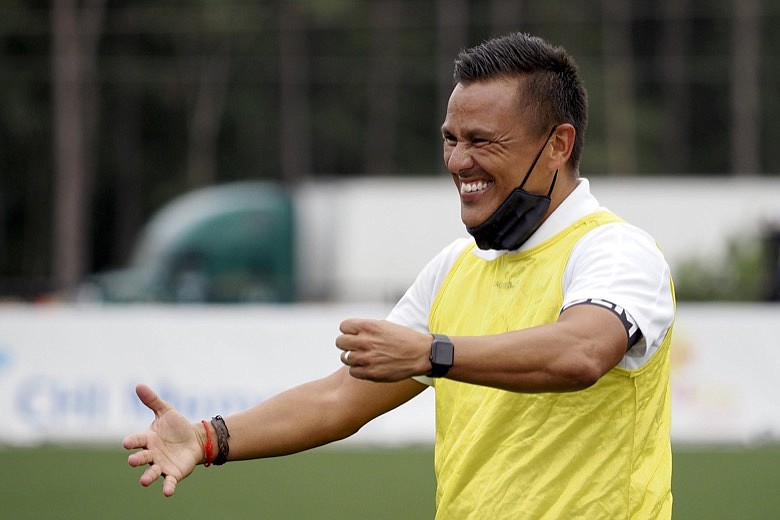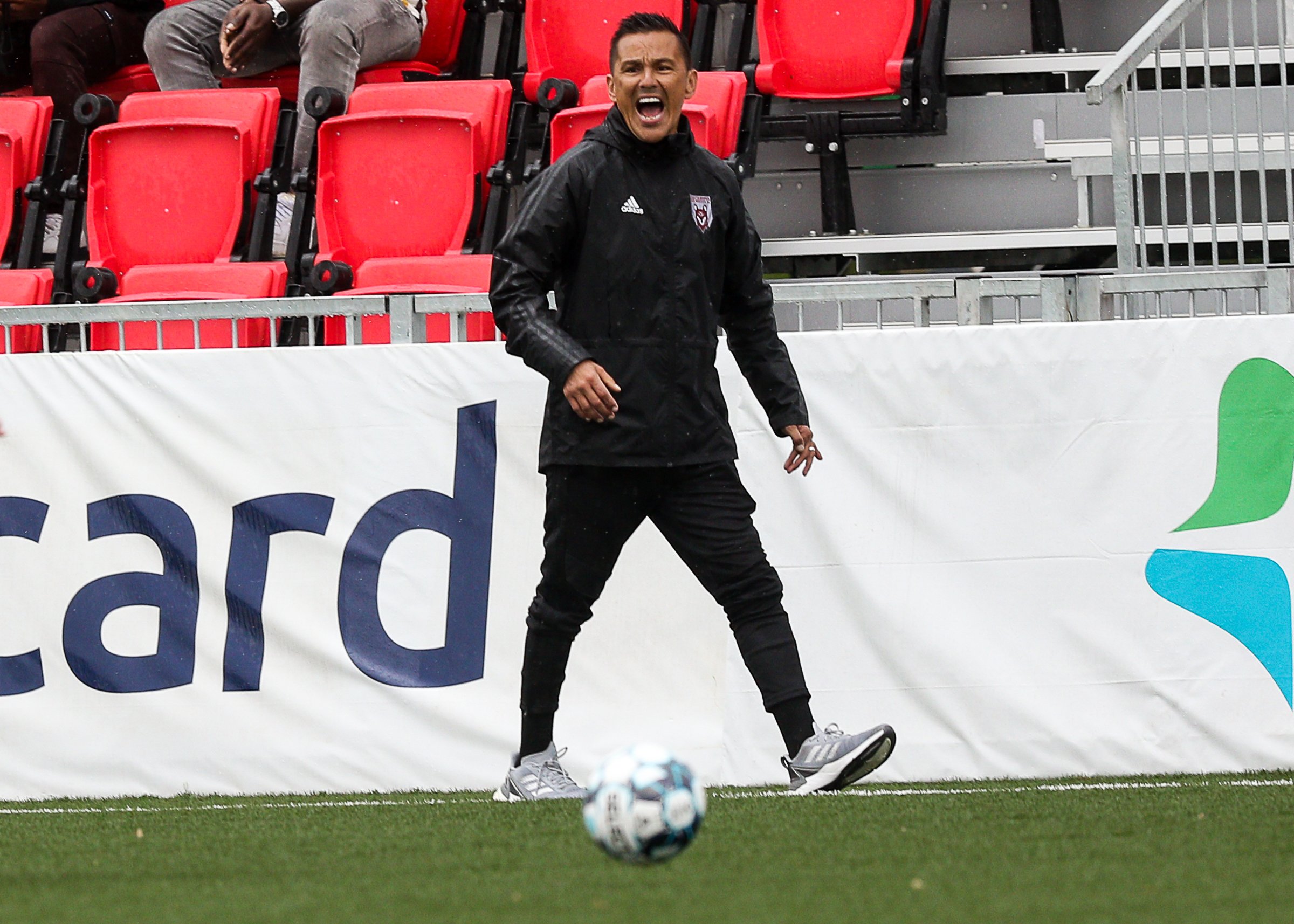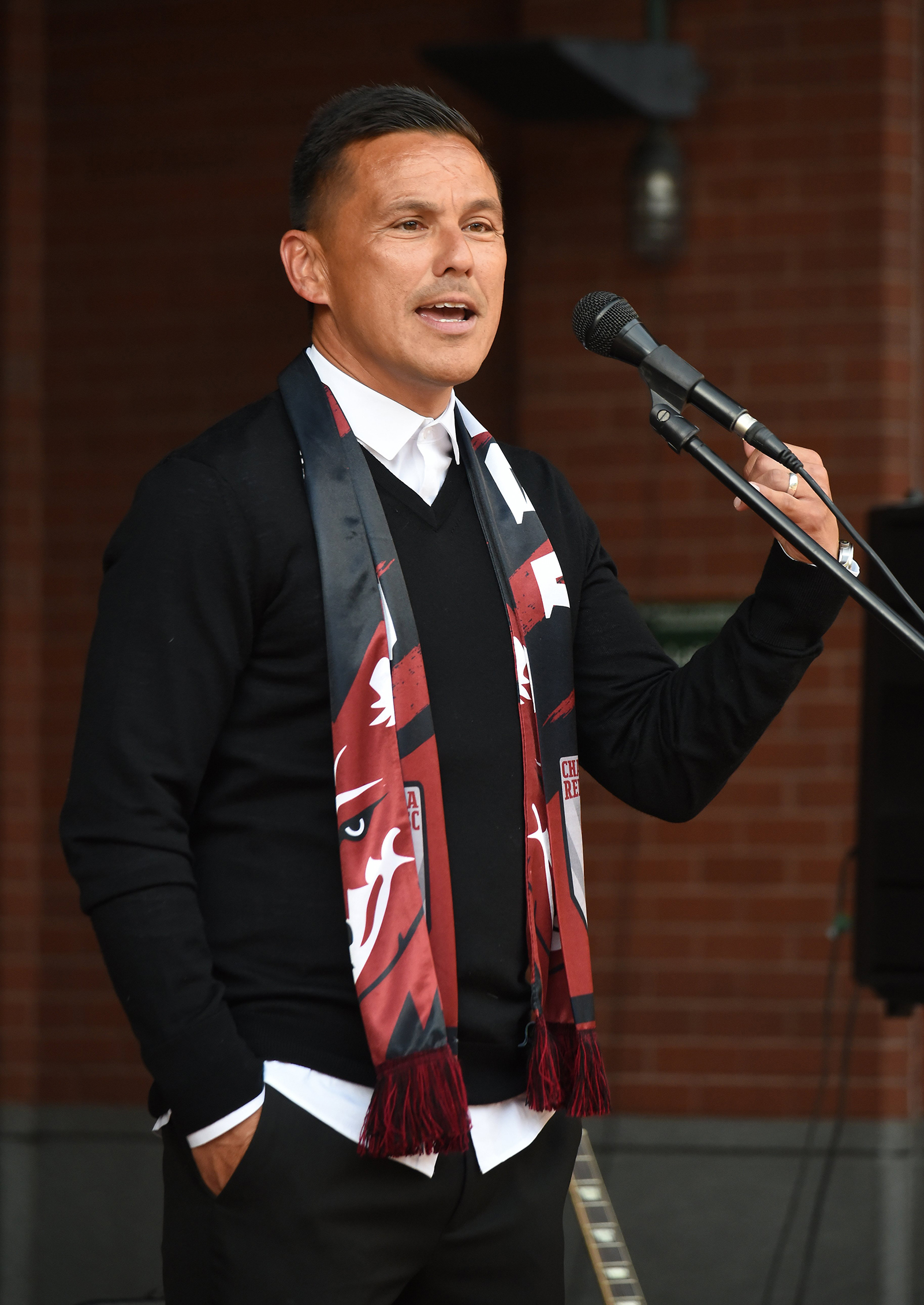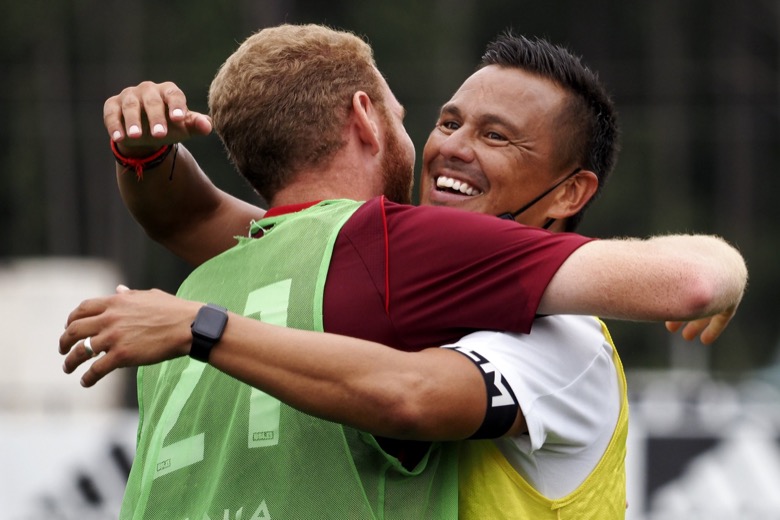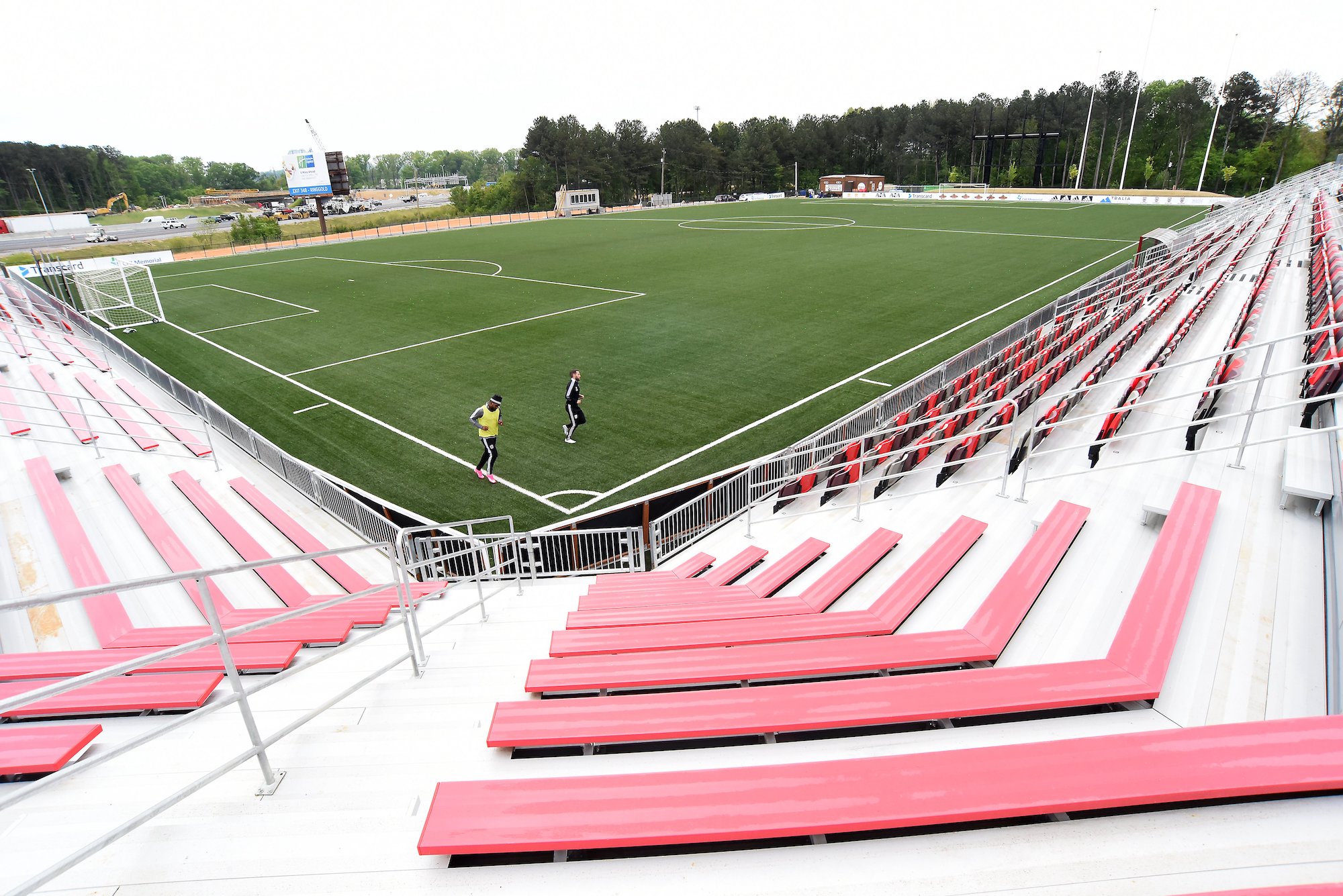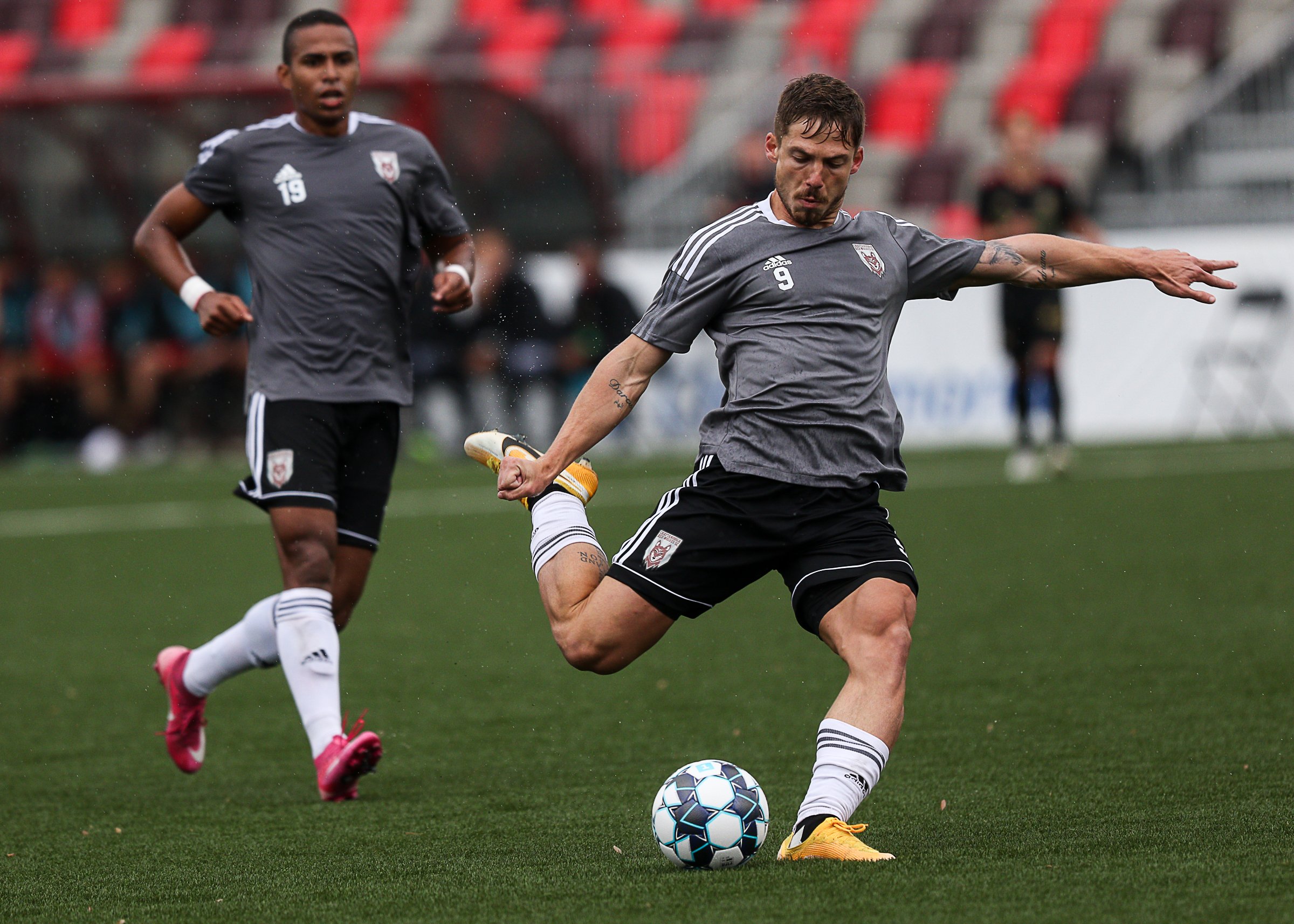The Chattanooga Red Wolves will open the home portion of their 2021 USL League One schedule at 7 p.m. Saturday in East Ridge. They'll face Fort Lauderdale CF at CHI Memorial Stadium, which is still under construction in its second season of use but has undergone a lot of growth from last year.
It's also the second season for head coach Jimmy Obleda, who guided the Red Wolves to 22 points in the league standings and a 6-5-4 record in 2020, which was good for fifth place but not good enough to qualify for a postseason that was reduced to a championship match that ultimately wasn't played because of COVID-19.
Chattanooga's roster went through a huge makeover in the offseason as Obleda and general manager Sean McDaniel tried to build a championship-caliber team, and the Red Wolves are off to a 1-0-1 start with four points in the standings after a 1-0 win at North Texas SC on May 8 and a 2-2 draw at New England Revolution II on Sunday. Fort Lauderdale is 3-3-0 and in third place, one point behind reigning champion Greenville Triumph SC and runner-up Union Omaha, which each has 10 points after starting 3-0-1.
Earlier this week, the Times Free Press met with Obleda to discuss a number of subjects pertaining to soccer in the city, as well as globally.
TFP: I've heard that everyone on your team can speak Spanish. Was that something that was important in terms of team building?
Obleda: I don't think the language is so much the binding factor with this group. When Sean and I started looking at players, they fit our mentality, our desire to leave everything and just be willing to sacrifice what you have to do to get the result, to fight for every ball, every moment, and really feel that they want to be a part of something. It just happened by coincidence that the players that we started looking at, identifying and bringing in came from South America, from Mexico, from difficult situations that they'd grown up in as kids. Everything they've accomplished, nothing was given to them, and I think that's a basic fundamental concept of what we're about, that nothing was given to any of us, including myself. We've had to work for it, and we value being here, we value representing this city and not taking it for granted.
So when we started looking at players and saying, "OK, this guy, he's a great soccer player, plus he has the extra part of his DNA, he has that survival skill." Then we started saying, "OK, he speaks Spanish and he's from here." So it just started connecting together.
So I wouldn't say it was necessarily the language that brought them together, it was more of their commonality of the struggles and the fights and what they've had to do to get to where they are today, and aside from being great soccer players, obviously. It helps tremendously that everyone speaks Spanish and the ones that don't are learning it quick. It's a happy culture, so it's good and everyone's embraced it. Culturally, it doesn't matter who you are, everyone's embraced what our identity is.
TFP: It seems at every level of soccer, your best teams are the ones that are multicultural, and that almost seems like a requirement. How much has that changed since your playing career?
JO: I grew up here (in the United States), and my dad would take me to the ethnic leagues with adults and stuff, but the leagues I played in were predominantly Caucasian, and there were only a few Hispanics per team. But as I've progressed and grown and went overseas and played and came back, you start seeing more and more different ethnicities, not just Hispanics playing, and it's just become so much more multicultural in this country. Around the world, it's always been like that, and you've seen it and I've seen it.
Just look at us; I don't think there are many teams like us in the league that has this much diversity, maybe FC Dallas. You can look at us, and we're predominantly Hispanic or Latino, right? That's kind of where we've led the culture in the direction and the type of soccer we want to play and the type of identity we want to have.
So going back to the question, they've grown up playing in that environment. They've grown up playing with older men, Hispanics, Serbians, Croatians, you name it, in their community, so being able to adjust to other people is easy to have that culture diversity to understand you know each other even in a different language, but still speak the same language. I'll be honest with you, it's great to see what was being built in that identity. Everyone speaks the same language of soccer on the field, but they're learning to speak the same language off the field.
This game has evolved so much, culturally it's evolved and that's another reason we want to put a team out that represents what the world is now. The world is multicultural, and for us to really play this brand of soccer, it's like globalization: It's not just one thing, it's everything meshed together to make these super successful businesses and super successful corporations and stuff. I'd be remiss to say I think we're happy with where we are, and we're only going to get better with this group.
TFP: Soccer has become so skilled now that you can't just pick it up in high school and expect to be competitive. To the younger demographics, it's far more popular. When did that change?
JO: That's a great question, because I've seen the change. I've seen it from the youth level when I first started coaching 25 years ago, to what it is now. I've seen it from the professional level. You started to see the change in the late 90s, early 2000s, when Premier League soccer started being on TV, and you started having the Italian leagues, and now the world becomes smaller because you can see everything around the world. When I was a kid, we had VHS, so I would tape a game, and I'd watch that game - I'd have stacks and stacks and stacks of games - because there was one game a weekend, so I'd watch that one game until the next Saturday. Now you turn on TV and there's three games on today, there's 10 games tomorrow, and you have this website you can go on and it can tell you every game and what channel you can find it on, so the world has become smaller of being able to see the game and now kids can grow up again.
My idols, Zico, Pele, Maradona, you'd have to see them through magazines and stuff. Now you can turn on your phone or your laptop or whatever it is, and you have a thousand stories on Cristiano Ronaldo in just an hour. When I was growing up, soccer was a communist sport. But now it's become normal, and now the younger generations have grown up and they have two, three, four kids, and all their kids play soccer, so I think it's going to continue to grow. I'd say in another 10-15 years, it's going to overtake some of those middle-tier, high-tier sports. I don't think it'll overtake football, but at this rate, it might overtake baseball in some level because it just is what it is, all evolution, right? It keeps moving forward.
The opportunities kids have now - when I was 16, I had to leave the country to play overseas. I could have gone to college and played, but that wasn't the path for me. If I wanted to be a professional, I had to go play overseas and do my thing. Now you can finish college, or you can come over here like (academy player turned Red Wolves signee) Cristian Zaragoza, and if you do, you can play in front of two or three thousand people and if you do even better, you can go up to (USL) Championship or Major League Soccer. So the opportunities you have now are multiplied by a thousand, where for me it was either go to college and play, or go overseas and try to make it.
These guys want these opportunities. These are guys that have come from difficult situations in Hispanic communities, these low-income communities, or they've gone through so much that to be here and see this and what it does for them? How can you not want to work hard? How can you not be hungry? That, "I don't care what it is, I'm going to do it" mentality. There's no difference in soccer in the rest of the world and basketball here. Kids grow up, every day they're shooting because that's the only way out. They're playing with older guys and they have a basketball in their hands every day. In the rest of the world, that's what (soccer) is, so you have to find those guys.
TFP: How does soccer take that next step in terms of popularity with the older generations in this country? With the facilities being built, it appears as though you're building something here in Chattanooga. How do you get them invested in what you're doing here?
JO: As far as the second question, I think it's coming and seeing what's been already invested in the city from a building standpoint. Then look at the team that you're coming to see and say, "Win or lose, that team plays and they get after it and they fight." I think in today's world, we're looking sometimes for that, because the world is crazy right now and everything that's going on, and we're looking for inspiration. We're looking for people to set the standard and be a guiding light for us, so I think for me, for this team and this club, for the casual person to embrace it, I think it's important for us to really jut continue to inspire and get people to say, "Man, I love watching them play and I love coming out in the environment. I love getting to know them."
With COVID, it was tough for us to get to meet people or people to meet us and connect with us, to see what we're about, but we're no different. We have dreams, just like anyone else, and we aspire to important things just like the person who works for $5 an hour or $20 an hour, we're no better. We bust our butts like everybody else, so I think that's important for us, and we take that very seriously, and I know the organization takes it very seriously to connect with it, for the Hispanic culture and Dalton and here in East Ridge to really come out and find a team they can identify with, to say, "That's my type of soccer, that's my type of people or I can see myself in them." Because we're still far away, because culturally, we have so many things here where we live in a great country, so many opportunities and we can watch football, baseball, basketball, tennis, lacrosse. I think it has to get to a point where we have a generation of soccer players that inspire the country, like the 1980 Miracle on Ice. The country was going through a difficult time in those years, and people remember that Olympic gold medal to this day, and it was inspiring and it got people to go, "That's my country. That's my team." We need to have a group - hopefully it's this group of (Christian) Pulisic and (John) Brooks - and all the guys playing overseas that can first qualify for the World Cup, and then in the World Cup do so well that we identify the next (generation).
That's what's happened with the women. They've inspired millions of little girls to play soccer and empowered little girls to becoming powerful women. I think that's amazing, you know, but they've won a World Cup, and they've won Olympics, so little girls look at them and go, "I can be that. That could be me if you work hard." And then they talk to you, then they take political views or positions that people go, "Wow, that's inspiring." So I think the men's side needs to have that for it to take off to perhaps the level that we hope the game could become in this country. I'm hoping in my lifetime I get to see that happen.
TFP: As you all try to continue to build this thing from the bottom, how important is it to perform well on Saturday? It's possible that CHI Memorial won't be fully done until September or October, which obviously coincides with football season. Is is important to put your best foot forward this weekend?
JO: This place needs to be a place where people come and say, "I'm coming back." How do you do that? You do that by winning; winning is the cure to everything because people follow winners, right? So when you're successful, people will come. We want to inspire people to go watch a game in this environment on a Saturday night. They say, "I'd rather come watch a game. I could always DVR the SEC game, but nothing is going to take away my experience of coming to a game, singing and chanting with supporters." So if we create that, the people will come. I mean, last year we had some really memorable moments and that brought more people.
So if we can do that - if we can inspire - when we're coming into September, we're in the playoff hunt and we're getting into the playoffs and we're hosting a playoff game. The stadium is going up. Now it's the lights, and eventually it becomes something big and we can remember this conversation in two years.
Contact Gene Henley at ghenley@timesfreepress.com. Follow him on Twitter @genehenley3.
